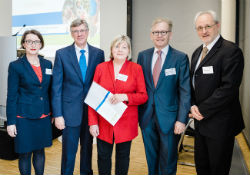National symposium on diabetes in Germany held to mark World Health Day 2016

Steffen Höft
"Strengthen prevention, promote treatment and further develop surveillance" was the theme of the national diabetes symposium, held on 7 April 2016 in the German Diabetes Centre to mark World Health Day 2016. Renowned experts emphasized the importance of this chronic condition and identified action that will have to be taken.
This year, some 130 participants, including policy- and decision-makers from governments and administrations, as well as specialists in the field of health, benefited from this specialist forum for discussion, professional development and continuing education.
Importance of diabetes
The importance of diabetes – both nationally and globally – was highlighted by Mr Lutz Stroppe, State Secretary at the German Federal Ministry of Health, Dr Gauden Galea, Director of the Division of Noncommunicable Diseases and Promoting Health through the Life-course at WHO/Europe, and Ms Helga Kühn-Mengel, Member of the German Bundestag and President of the German Federal Association for Prevention and Health Promotion, in their opening addresses.
Dr Galea pointed out that tackling the global diabetes epidemic requires the engagement and dedication of the international community. He added that the political declaration of the 2011 United Nations High-level Meeting on Non-communicable Diseases constituted a sound basis for this purpose. In Germany, the Prevention Act could also serve as an important measure to counter the rise of this chronic condition. Both Mr Stroppe and Ms Kühn-Mengel emphasized that the Act provides significant means for reaching men and women of all ages and from many different walks of life.
After the opening addresses, Dr Viktor Jörgens, Honorary Member of the European Association for the Study of Diabetes, and Andrea Icks, Professor at the University of Düsseldorf and member of the Organisation for Economic Co-operation and Development Expert Group on the Economics of Prevention, discussed the question: "How does Germany compare internationally in terms of the prevention and care of diabetes?"
Both speakers stressed the importance of common research in Europe and said that the fundamental requirements for collaboration were readiness to forge international cooperation networks and political support. Moreover, greater effort should be made to improve the comparability of (international) data, which is a significant basis for tackling diabetes.
Challenges of diabetes prevention and research
Speakers in the afternoon sessions turned their attention to the challenges of diabetes prevention and research.
Dr Heidrun Thaiss, Head of the German Federal Centre for Health Education, noted the lack of knowledge about this chronic condition in the population. She called for a national education and information strategy for diabetes, appropriately designed to reach the relevant target groups, in order to raise awareness about diabetes, heighten social acceptance of people with diabetes and support achievement of national health targets for type-2 diabetes, as well as the targets contained in the St Vincent Declaration.
Professor Hans-Ulrich Häring, Medical Director of the Clinic for Internal Medicine at the University Clinic of Tübingen, stressed the importance of lifestyle-related measures. He also presented the latest research results, which indicate that not all patients benefit from such measures to the same extent.
The contribution made by the German Federal Ministry of Food and Agriculture to the fight against diabetes was presented by Dr Klaus Heider, Under-Secretary in the Ministry and Head of the Department of Food Policy, Product Safety and Innovation. He said that the aims of the Ministry's strategic approach are to encourage citizens to lead healthier lives through education, information and motivation and to facilitate healthier behaviour by means of various incentives and measures.
Professor Michael Roden, Director of the German Diabetes Centre, gave an overview of diabetes research in Germany. He ascribed particular significance to the founding of the Centre, which has brought together expertise and know-how in Germany under one roof. He explained that it was the aim of the Centre to make a lasting contribution to tailored diabetes prevention, diagnosis and therapy by means of a new, integrated research approach.
Prevention and control of diabetes
In the final sessions, Professor Dr Baptist Gallwitz, President of the German Diabetes Society, Dr Bernd Hagen of the Central Research Institute of Ambulatory Health Care, Dr Christian Berg, Deputy Chairman of diabetesDE – German Diabetes Support – and Dr Andreas Ziese, Head of Health Reporting at the Robert Koch Institute, provided highlights in various areas of the prevention and control of diabetes. These included:
- promoting primary prevention and early diagnosis of type-2 diabetes
- epidemiology and surveillance
- improving care
- strengthening transnational and interdisciplinary research
- strengthening self-management by patients.
Finally, Ms Karin Knufmann-Happe, Under-Secretary and Head of the Department of Health Protection, Disease Control and Biomedicine at the German Federal Ministry of Health, reviewed and summarized the day's presentations. She emphasized that Germany accorded high priority to the control of diabetes. She stressed the multi-dimensional nature and complexity of the condition and said that the need for action highlighted throughout the day's proceedings would require further cross-disciplinary and cross-professional endeavour in the fields of prevention, care and research.
Cooperation between the German Federal Ministry of Health and the German Federal Association for Prevention and Health Promotion as part of World Health Day is a long-standing tradition, the first such event having been hosted by the latter organization in 1958.



